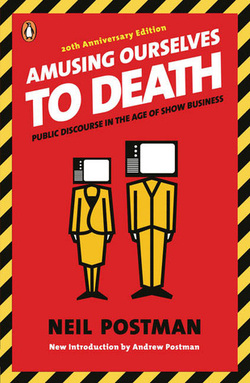 A Paradigm Shift in Our Understanding of Communication Although there's definitely a temptation for us to amuse ourselves to death with things that have always had the intent of amusement (sitcoms, dramas, sci-fi, fantasy, etc), Neil Postman has nothing bad to say about "junk television" (as it's called in the introduction). Rather, his very compelling argument is that we're turning into a society that will amuse itself to death because our capacity to comprehend and act on things is transforming into one that only operates on amusement itself. In other words, it's not that we make things for the sake of amusement that will hurt us, it's that we now make everything - even things that are not meant to be amusing - into a venue of entertainment.(1) While originally published in 1985, I sincerely think this book is just as relevant today (in the age of Google, Youtube, Facebook, and Twitter)* if not even more so than when it was first penned. Postman takes the reader through the history of our mediums of communication and shows (and I mean, really shows from history) that when our culture of communication started to turn from the printed word to visual images, our capacity to think through things cogently had started to drop significantly. Our attention span has taken a terrible plummet. And even our humanity has been desensitized to a degree. In just this short book (163 pages), he shows so effectively that when we watch TV for things like news, education, religion, we're not being given news, education, or religion - we're being given entertainment (in the sense of amusement for amusement's sake)(1). A succinct summary from his son in the introduction puts it well: "Silence has been replaced by background noise. ... [He did not] fear TV across the board (as some thought). Junk television was fine. "The A-Team andCheers are no threat to our public health," he wrote. "60 Minutes, Eyewitness News, and Sesame Street are" (ix, xv). The whole time reading through this, I couldn't help but to think of how many more mediums have been affected by this same thing since 1985. And it's very difficult to number them. And it's very hard not to see the whole realm of news, politics, education, and even many churches truly living out what he saw so long ago. Throughout the book he contrasts the two novels of Brave New World, by Aldous Huxley, and 1984, by George Orwell. Whereas1984 predicts a world governed by coercion from the state, Brave New World predicts a world governed by hedonism. Or, as Postman put it: "In short, Orwell feared that what we hate will ruin us. Huxley feared that what we love will ruin us. ... This book is about the possibility that Huxley, not Orwell was right" (xx). And Postman does a very great job of demonstrating that possibility. Regardless of your own conclusions at the end of the book (I know I have some of my own), I do think it would be nearly impossible to read this and not be affected in how you view TV or the internet, or all sorts of other avenues of communication. And while I don't think Neil Postman was a Christian (in the Biblical sense of the term), I have no hesitation recommending this very thoughtful work on the evaluation of our culture. Even though it was published almost 30 years ago, it's very applicable even today. (1) I'm in agreement with Postman, in that there's nothing inherently wrong with entertainment for entertainment's sake. Of course, I think there are certain stipulations to be put on what we qualify as Biblical entertainment and the purpose of it. But I do think there's a purpose for it.
* Yes, I'm aware that Google owns Youtube. |
Categories
All
|